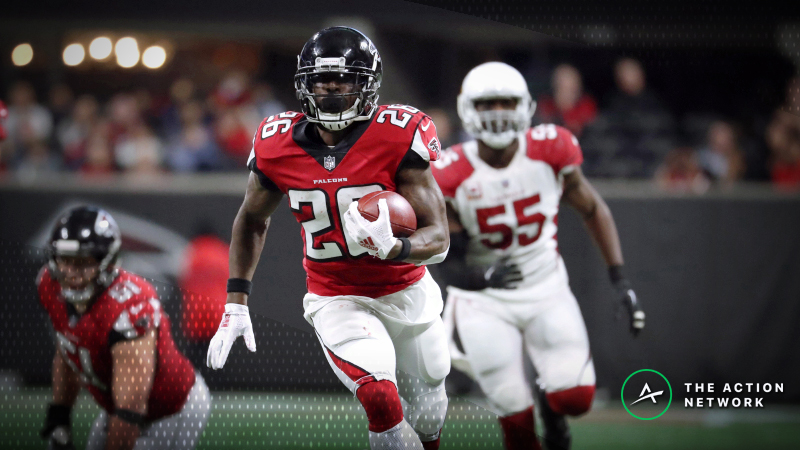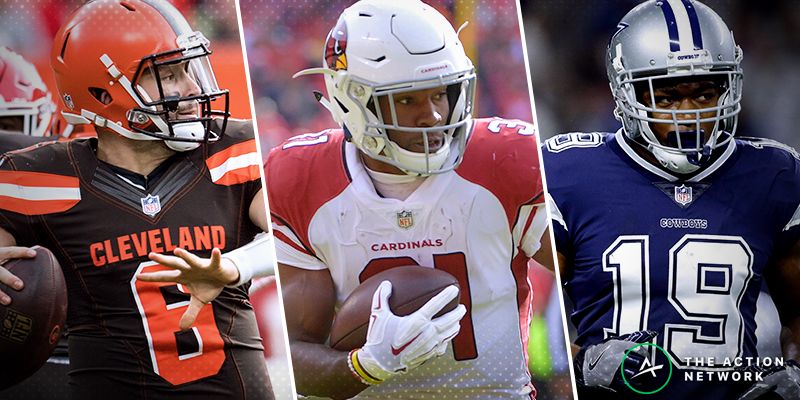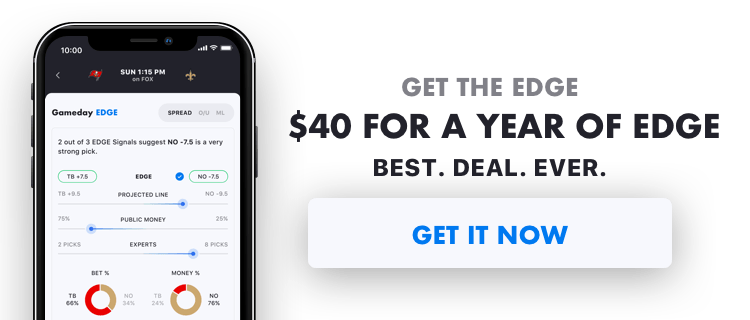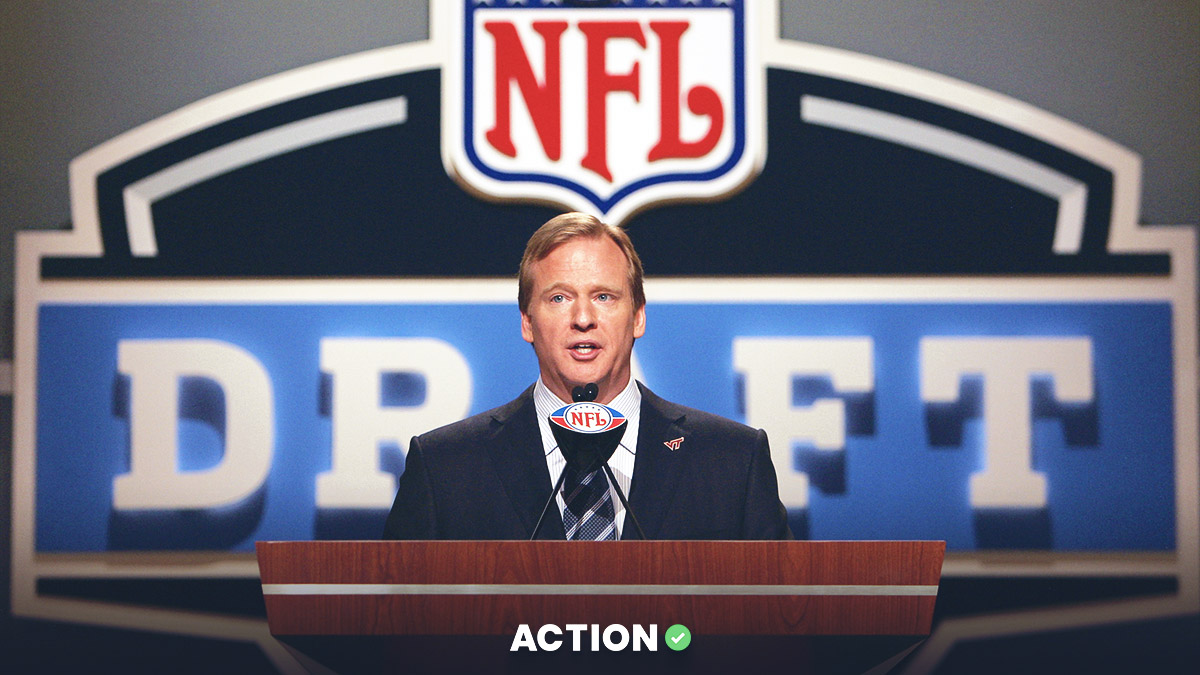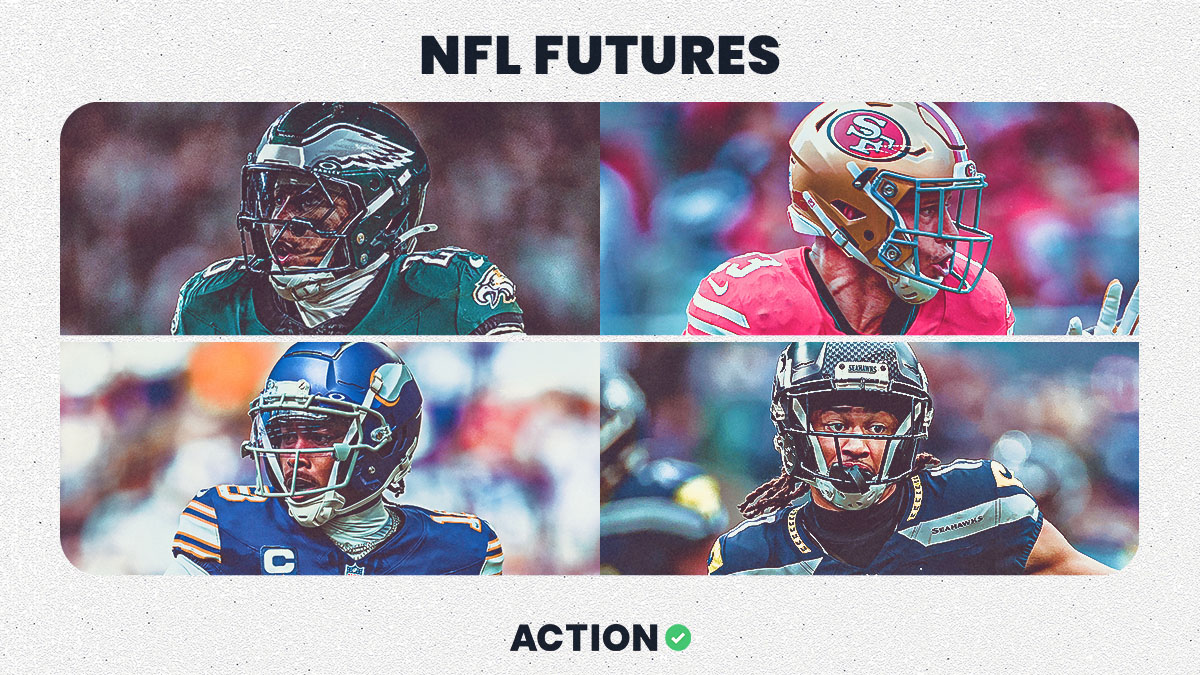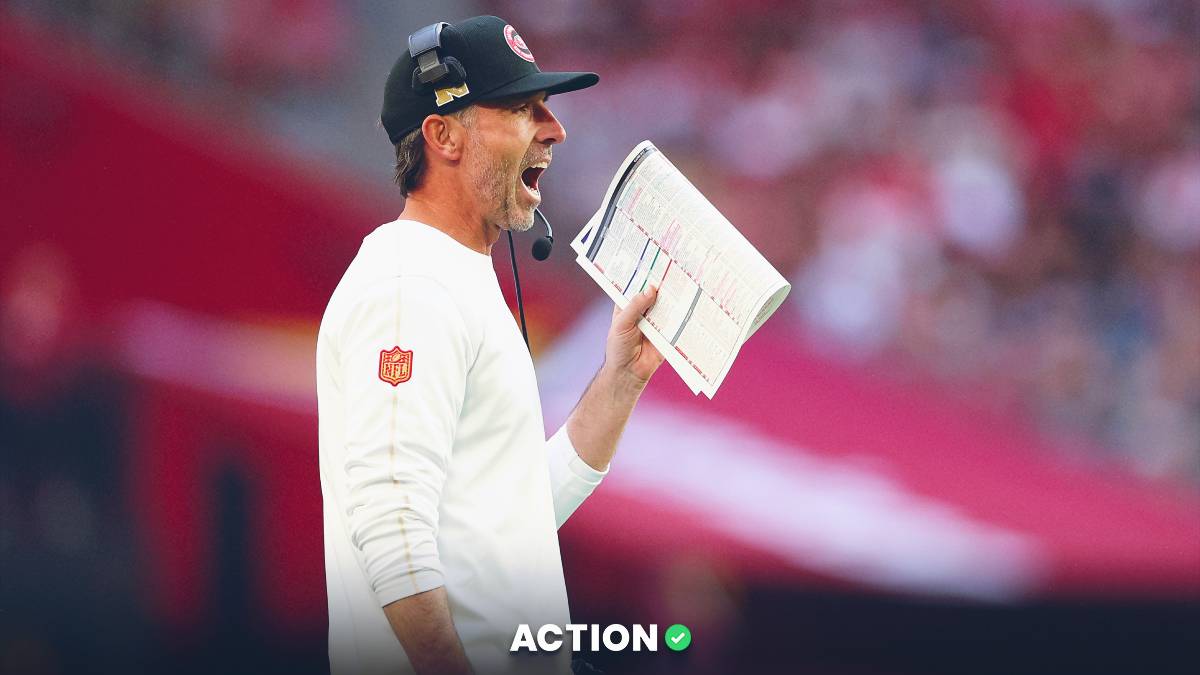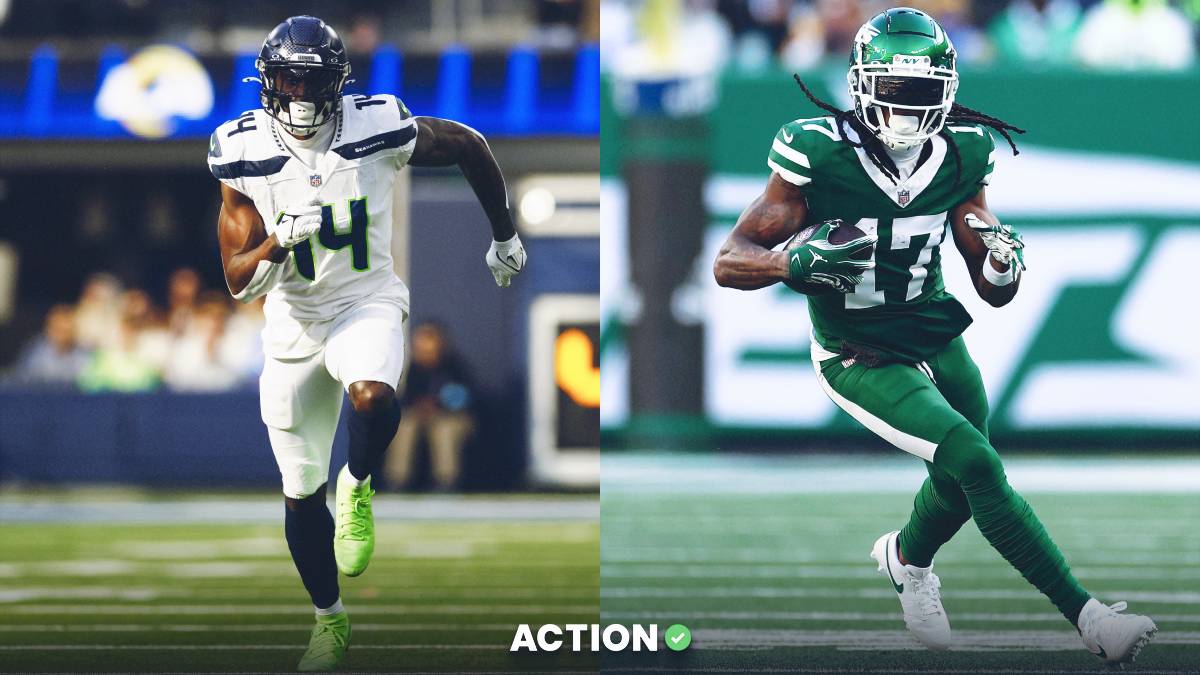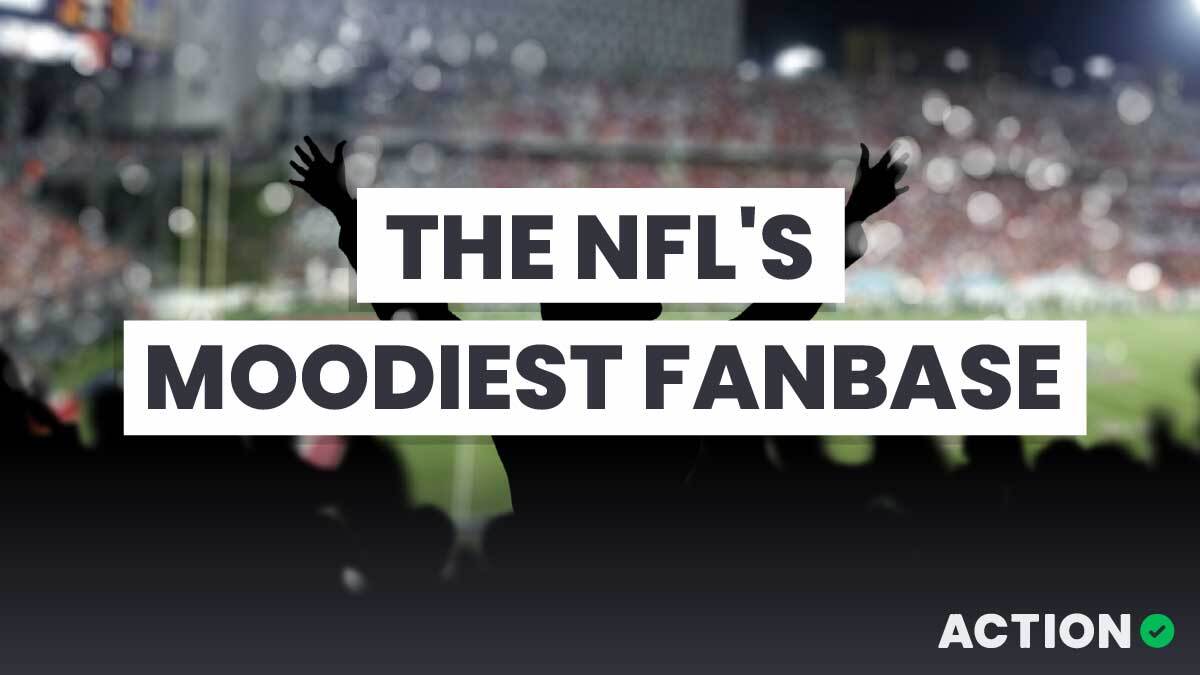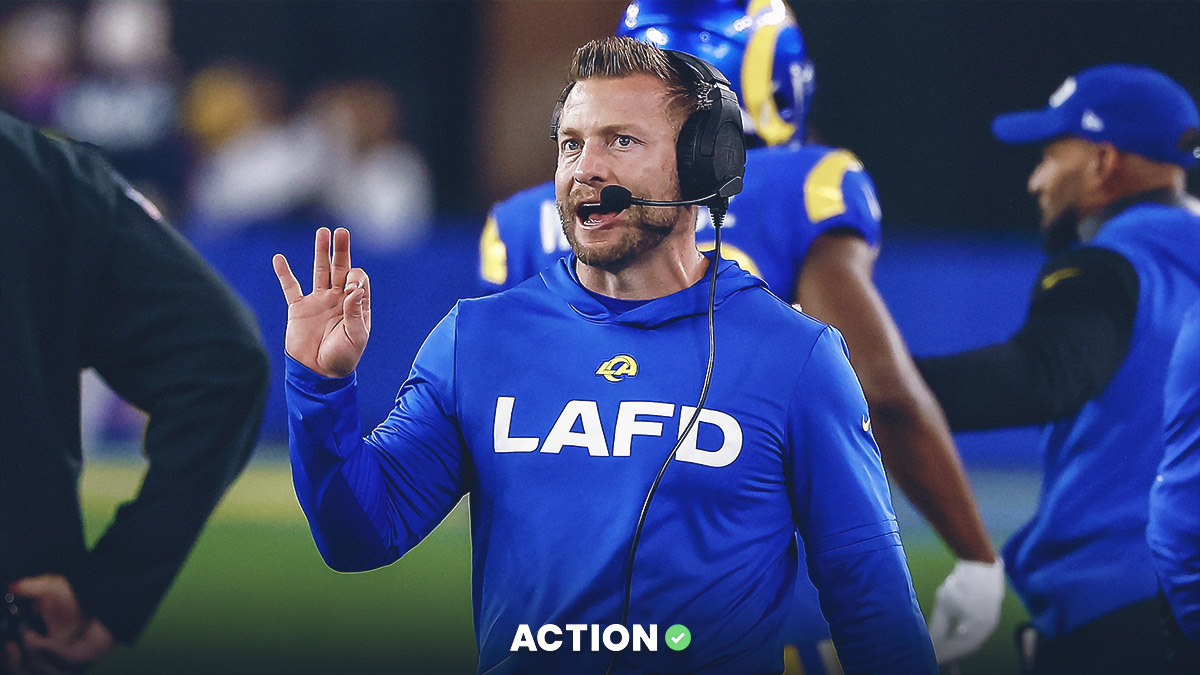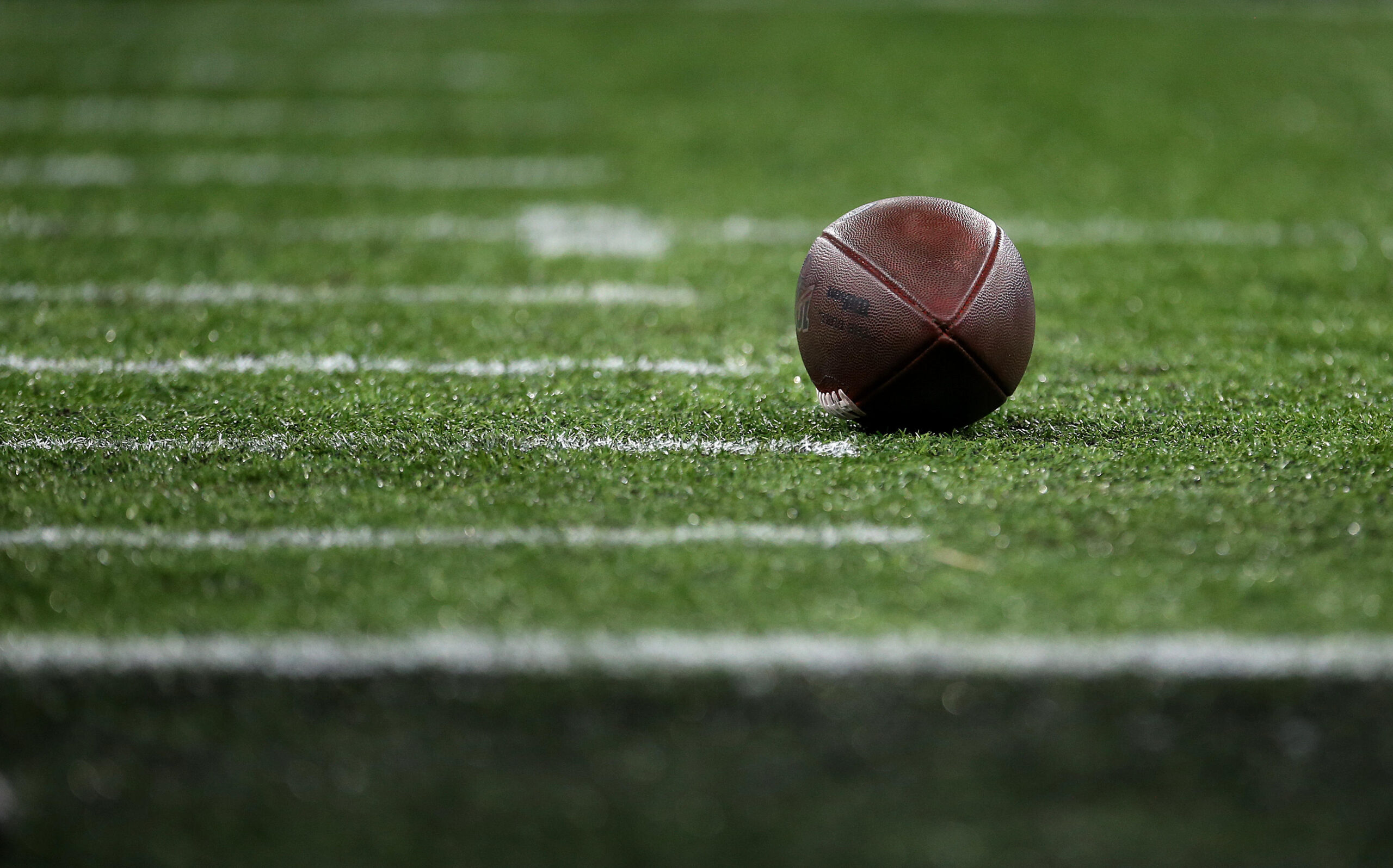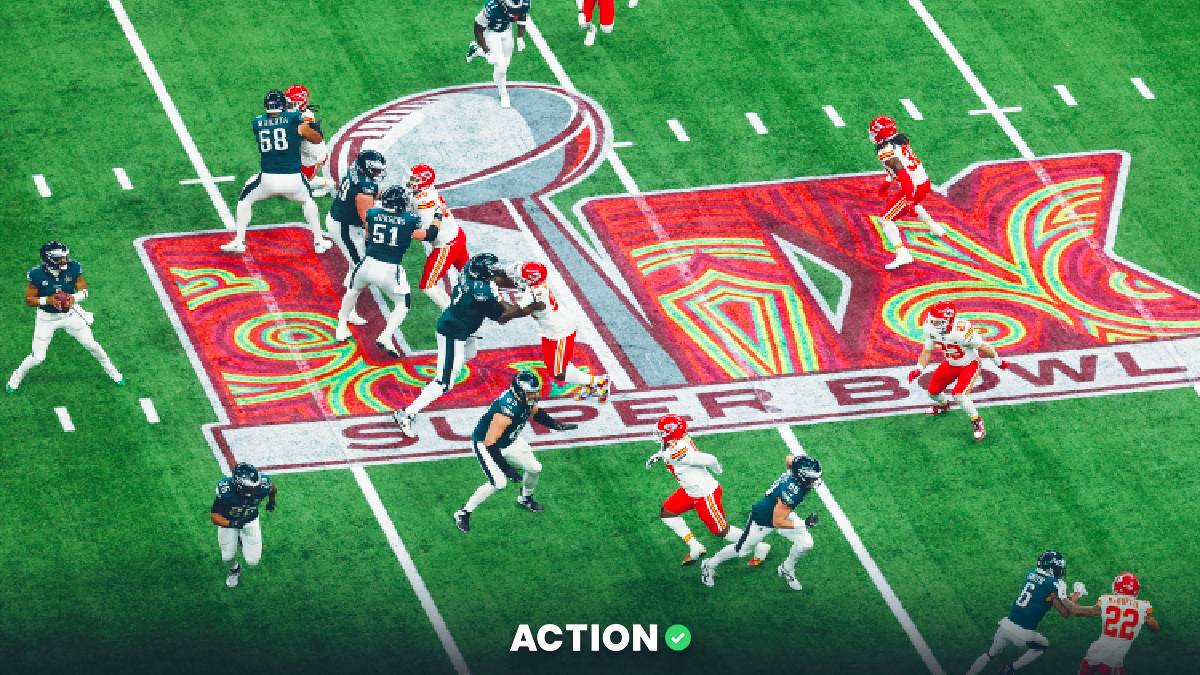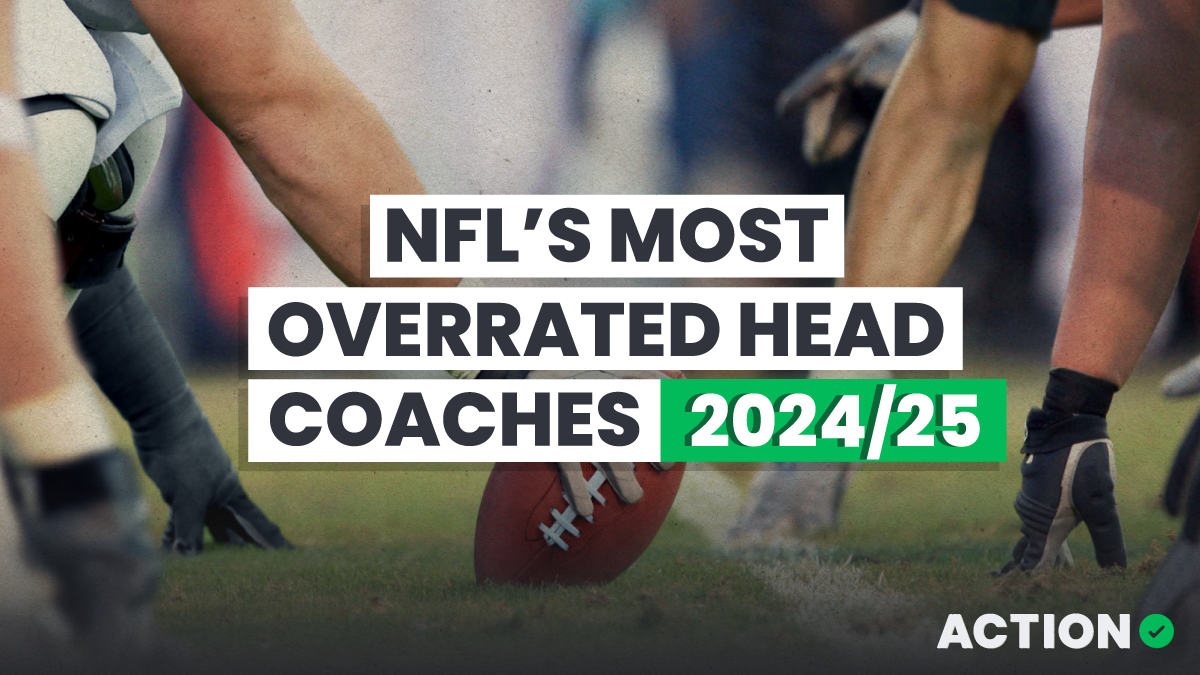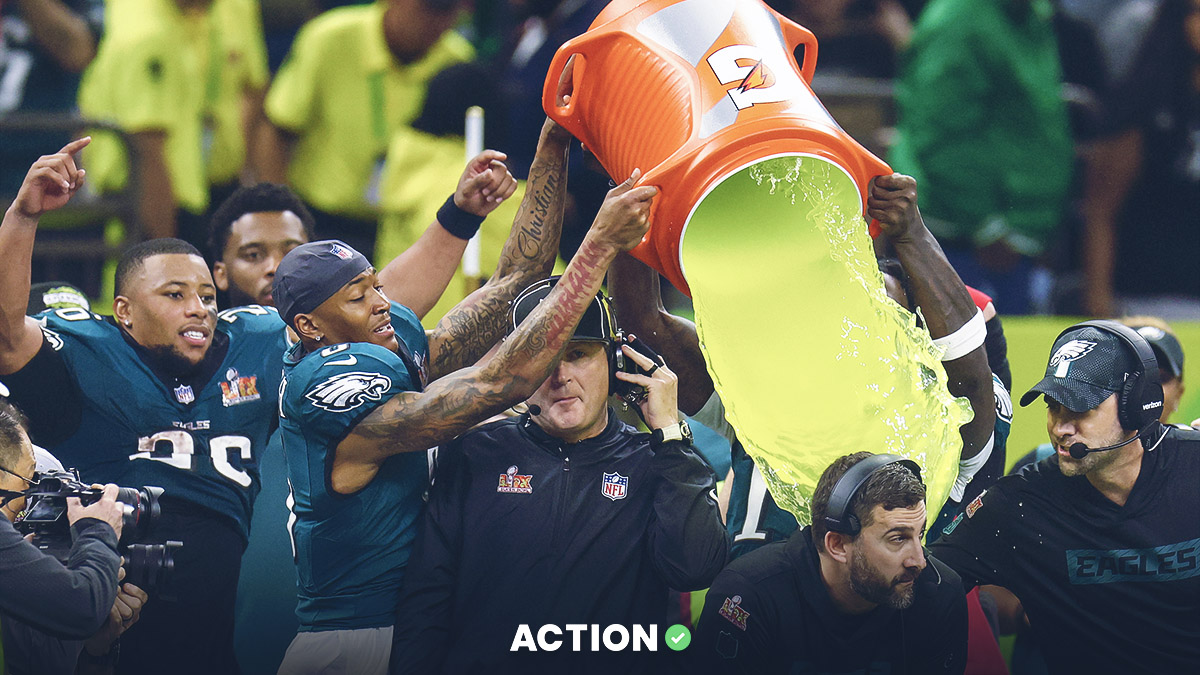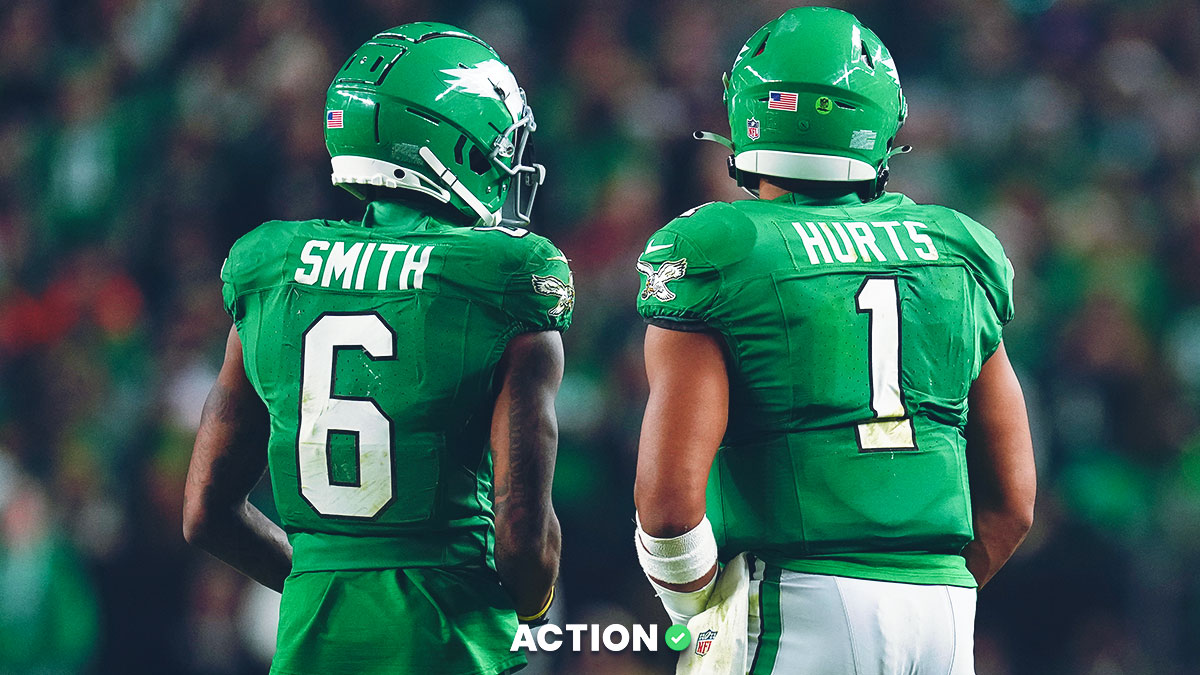In this article, I compare players with similar ESPN fantasy projections based on our Action Network Consensus Rankings and projections. In doing so, I advocate starting players with higher upside and fading comparable players with downside risk.
Since moving to this new format in Week 9, we've gone 21-8 (72% win-rate) on our recommendations. Last week we went 5-0 for the first time this season — let's see if we can keep that momentum rolling for Week 16.
All rankings and projections are based on PPR scoring. Reported player projections are based on median expected outcome and are current as of writing. For a complete breakdown of all players, check out our FantasyLabs Models powered by "The Oddsmaker," Sean Koerner.
Quarterback: Start Deshaun Watson over Philip Rivers
Sit Philip Rivers
Last week, I advised fading Jameis Winston and the Buccaneers offense against the Ravens. This week, we're running it back with the Chargers' Philip Rivers.
First, let's remind ourselves just how dominant Baltimore's defense has been. It ranks second in Football Outsiders' pass defense DVOA and allows the fewest points (18.1), third-fewest passing yards (202.6), and third-lowest QB Rating (82.9) per game.
In recent weeks, the Ravens have suffocated the Falcons' and Buccaneers' offenses, both of which rank in the top 10 in pass offense DVOA and top five in passing yards per game.
Baltimore held Matt Ryan to 131 passing yards and 7.6 fantasy points in Week 13. It also limited Winston to 156 passing yards and 4.3 fantasy points in Week 15.
The Chargers may choose to attack Baltimore on the ground rather than airing it out against that stingy secondary. The potential return of running back Melvin Gordon (knee) should help them do exactly that.
Start Deshaun Watson
A great alternative for Rivers this week is Texans quarterback Deshaun Watson. He draws an excellent matchup against the Eagles' porous secondary, which concedes the second-most passing yards (280.8) and ninth-most fantasy points (18.5) per game to quarterbacks.
Diving a little deeper, if you exclude Philadelphia's Week 13 game against the Redskins (starting Mark Sanchez), the Eagles have allowed a staggering 320.5 passing yards on 41.4 pass attempts per game since Week 4.
Meanwhile, Watson's passing yardage output has increased in five consecutive weeks, corresponding with his best fantasy stretch so far this year. Since Week 12, he's averaging 6.3 rush attempts, 40.3 rushing yards, 8.22 yards per pass attempts, and a 74.4% completion percentage.
He has scored six passing touchdowns and one rushing touchdown while failing to record a single interception or fumble.
He ranks third among quarterbacks in PPR points per game (21.5) over that span and should feast against one of the worst secondary units in the league. Running back Lamar Miller (ankle) is also questionable to play. If he sits out, that could further elevate Watson's fantasy floor.
Running Back: Start Tevin Coleman over Mark Ingram
Start Tevin Coleman
Coleman has had a frustrating and confusing 2018-19 campaign. Early this season, Falcons running back Devonta Freeman (knee) was placed on Injured Reserve. That — in theory — opened the door for Coleman to seize a bell-cow role as Atlanta's workhorse back.
Of course, that pipe dream never came to fruition. Instead, rookie Ito Smith slotted in next to Coleman, keeping Atlanta's by-committee approach alive. The Falcons duo of running backs have commanded close to a 60-40 split since Week 6.
Smith has averaged 7.7 rush attempts and 2.6 pass targets per game while Coleman has averaged 9.8 rush attempts and 3.1 pass targets per game.
But, now that Smith (knee) has also been placed on Injured Reserve, it could — again, in theory — reopen the door for Coleman to finally see workhorse touches.
Of course, rookie Brian Hill and practice squad veteran Jeremy Langford loom in the wings of the Falcons' depth chart. Nonetheless, neither projects as meaningful competition for Coleman's touches.
Coleman ranks 16th among running backs with 176.1 total PPR fantasy points through Week 14. But, he hasn't exactly felt like the fantasy RB16 for fantasy team owners.
He has finished as a fantasy RB1 three weeks, RB2 five weeks, RB3 three weeks, and he has placed outside the top 36 at the position on three occasions. His average finishing position per week is an uninspiring RB25.
His frustrating week-to-week production notwithstanding, there is still cause for optimism given the vacation of Smith's previous workload. Coleman's projected volume could approach 20-plus touches against the Panthers.
He boasts the 12th-highest median and ninth-highest ceiling projections among running backs this week and is coming off a season-best 145 rushing yards against the Cardinals.
Sit Mark Ingram
While Coleman may be ascending into lead-back duties, Saints running back Mark Ingram is firmly locked into a committee with Alvin Kamara. The duo has proven its ability to generate starting fantasy production for both backs in the past, but Ingram has been trending downward recently.
Since Week 12, he has averaged 10.8 rush attempts, 48.5 rushing yards, 1.8 receptions and 6.8 receiving yards per game. His 8.8 PPR fantasy points per game over that span ranks 36th among running backs.
In addition to his poor overall volume, he also has not earned ample red-zone touches. For the season, Ingram has 22 red-zone rush attempts (Kamara has 47) and only one red-zone passing target (Kamara has 28).
As a result, Ingram's Week 15 outlook against the Steelers is less than ideal. Pittsburgh ranks eighth in run defense DVOA and ninth in pass defense DVOA. It has allowed the ninth-fewest fantasy points (16.4), seventh-fewest rushing yards (80.0), and third-fewest receiving yards (29.6) per game to running backs.
Wide Receiver: Start Robby Anderson over Dede Westbrook
Start Robby Anderson
We never want to react too strongly to recent production, but there's also something to be said for riding the hot hand. And Robby Anderson is red-hot.
Since quarterback Sam Darnold returned from injury in Week 14, Anderson has averaged nine targets, 5.5 receptions, 86 receiving yards and a touchdown per game.
His 20.1 average PPR fantasy points ranks eighth among wide receivers. Impressively, he's achieved those high marks against the Bills' and Texans' elite defenses.
In 10 games with both Darnold and Anderson active, Anderson ranks ninth in the NFL in air yards (966). He also boasts an average depth of target of 16.4, which ranks in the top-10th percentile among wide receivers.
In addition to those statistical trends, he also faces a mediocre Packers secondary in Week 16. Green Bay ranks 24th in pass defense DVOA, 22nd in pass defense against No. 1 wide receivers, and 29th in pass defense on deep passes (over 16 air yards).
Sit Dede Westbrook
Westbrook is perhaps the most-talented receiver on the Jaguars roster. While his long-term outlook looks promising, poor quarterback play severely limits his short-term potential.
When Jacksonville promoted Cody Kessler to starting quarterback in Week 13, it claimed the move was to stimulate the passing offense. However, the play-calling has not supported this narrative.
Not only have the Jaguars' pass attempts per game decreased, but nearly all of their offensive statistics have plummeted with Kessler at the helm.
This leaves little opportunity for Westbrook — or any of the Jaguars receivers — to post consistent fantasy production. Jacksonville's Week 16 matchup against the Dolphins reinforces its low passing and scoring ceiling.
This contest features the second-lowest Vegas total (38.5) on the slate. The Jaguars also have the fourth-lowest implied team total (17.3), which does not inspire confidence in Westbrook's scoring upside.
Westbrook has finished outside the top 36 at his position in seven of 14 games this season and has totaled 44 receiving yards or fewer in eight of his last nine games. He ranks 44th in median projection and 55th in ceiling projection among wide receivers this week.
Wide Receiver: Start Adam Humphries over Mohamed Sanu
Start Adam Humphries
We knew that last week's bout against the Ravens' second-ranked pass defense DVOA would likely stifle Tampa Bay's passing attack. Humphries managed only four receptions for 23 yards on six targets.
However, a new week brings new opportunity against a more forgiving Cowboys defense. So, it's time to fire Humphries back up as a fantasy starter.
Since the Buccaneers' Week 5 bye, Humphries has averaged 6.8 targets, 4.8 receptions, 57.0 receiving yards and 0.5 touchdowns per game. He ranks 17th among wide receivers over that span with 13.6 PPR fantasy points per game.
Humphries' target share has also swelled to 22% since Tampa Bay committed to Winston as its starter in Week 12. That 22% target share is tied for the team lead with Mike Evans. Humphries also leads the team in red-zone targets (15), 13 of which have come since Week 8. He boasts an impressive 30.2% red-zone target share over that span.
Sit Mohamed Sanu
Sanu has been remarkably consistent in his receiving output each week, but that consistency has not resulted in viable starting fantasy production. Since Week 7, he ranks 47th among wide receivers with 8.5 PPR fantasy points per game and has failed to score a touchdown. His poor scoring production is no red herring; he has only three red-zone targets in his last eight games.
In addition to his poor scoring potential, he is also locked in a pseudo-time share with Calvin Ridley. Atlanta employs three-wide receiver personnel on 66.74% of its offensive snaps, which ranks 21st in the NFL.
His below-average on-field opportunity is compounded by his relatively poor target share. He ranks third on the team in targets, receptions, air yards and average depth of target.
Perhaps most importantly, Panthers quarterback Cam Newton (shoulder) has officially been shut down for the remainder of the season. It is reasonable to expect Atlanta to dispatch Carolina without its franchise quarterback, which may promote a game script favoring the running game.
Unless this game unexpectedly turns into a shootout, it's hard to imagine Sanu making a real splash statistically. Our NFL Player Models bear this out: he ranks 41st among wide receivers in median projection and 43rd in ceiling projection for Week 16.
Tight End: Start Evan Engram over Austin Hooper
Sit Austin Hooper
Let's keep my "fade Falcons receivers" take going with Hooper. On paper, the Panthers seem to be a great matchup, ranking 26th in defense DVOA and 28th in pass defense DVOA. But, since Week 11, they've really tightened things up defensively, especially against opposing tight ends.
Over that span, starting tight ends have averaged just three targets, two receptions, 26.8 receiving yards and zero touchdowns per game. Carolina has conceded on average 4.7 PPR fantasy points to opposing tight ends, who have an average weekly finish of TE26.
Concurrently since Week 11, Hooper has faded in Atlanta's target distribution. He has ranked fourth in receptions (18), receiving yards (139), target share (14%), and air yards market share (7%) in his last five games. He is also coming off a 0-0-0 receiving performance against the Cardinals.
Start Evan Engram
Engram has greatly benefited from Odell Beckham Jr.'s (quad) absence over the last two weeks. He has averaged 8.5 targets, 5.5 receptions and 76.0 receiving yards in Weeks 14 and 15. His 13.1 PPR fantasy points per game rank fourth among tight ends over that short span.
Perhaps Engram's production is a result of small sample size variance. However, if we expand our view back to Week 8, his statistics still suggest that he has ascended in the Giants' receiving pecking order.
Over that five-game sample, he is tied for first on the team with 33 targets, second with 22 receptions, first with 289 receiving yards, first with 191 yards after catch, and tied for first with a 20% team target share. He has averaged 11.4 PPR points per game over that span, which ranks eighth among tight ends.
He draws an advantageous matchup against the Colts this week, who rank 17th in pass defense DVOA and 23rd in pass defense against tight ends. Indianapolis has conceded the third-most targets (8.1), second-most receptions (6.3) and most receiving yards (72.6) per game to tight ends this season.


